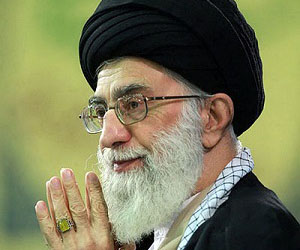By Joseph Braude
Official Iranian estimates suggest that the volume of anti-government protests is tapering. Interior Minister Abdolreza Rahmani Fazli says about 42,000 people at most took part over the initial week of demonstrations. In light of claims by lawmaker Mahmoud Sadeghi that the number of arrests has reached 3,700, it would appear that close to one in ten participants is now behind bars. Any leadership figures who may have emerged among the crowds were likely the first targets for arrest.
Tehran’s leadership meanwhile maintains a policy of rhetorical containment — that is, acknowledging protestors’ grievances while gently advising them to settle down on pain of arrest. Prior comments to this effect by President Hassan Rouhani were echoed Tuesday by Supreme Leader Ali Khamenei at a speech in Qom. Reiterating the claim that foreign powers had instigated the turmoil, he named the U.S. and Israel, fingered the Mojahedin-e Khalq as their on-the-ground ally, and alluded to Saudi Arabia by mentioning a “wealthy government” in the Gulf. Having in this sense disparaged the protest movement, he went on to acknowledge widespread economic frustration and dub demands for relief by some demonstrators legitimate. “These appeals must be dealt with and heard out,” he said. “They must be answered as much as possible. I myself am responsible” for accountability measures to follow, he added.
Among informed voices outside Iran to weigh in on the developments has been Yossi Cohen, the chief of Israel’s Mossad. At an address to a gathering of Israel’s Finance Ministry, he warned that the internal unrest has in no way impeded the Islamic Republic’s “galloping into the Middle East without hindrance.” Cohen’s reading of the causes behind the demonstrations emphasized economic grievances, and assessed the chances of a new Iranian revolution as unlikely in the foreseeable future.
In Washington, the U.S. House of Representatives passed a resolution in support of Iranian protestors’ right to free expression by a vote of 415 to 2. House Foreign Affairs Committee chairman Ed Royce stressed that U.S. sanctions “target the oppressive destabilizing regime, not the people of Iran.” No consensus has meanwhile emerged about the future of the Iranian nuclear deal, with Vice President Mike Pence disparaging it in a VOA interview and Democratic Congressman Brad Sherman noting that support persist for the pact, particularly among his party. Among right-wing voices outside government, former American UN Ambassador John Bolton Tweeted that the U.S. should be prepared to directly support protestors — implying financial and potentially other forms of backing — should they ask for it.
Among European leaders, there remains little indication of a change in the EU policy of studied neutrality. A different kind of pressure on Iran has emanated from Berlin, however, which summoned Iran’s ambassador to warn its local spies to stop eavesdropping on pro-Israel civic actors in the country. In The National, columnist Faisal Al-Yafai assessed that French leader Emmanuel Macron’s robust criticism of international support for the protestors was somehow of a piece with its policy of neutrality in proxy conflicts between Iran and Saudi Arabia.













